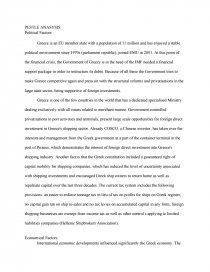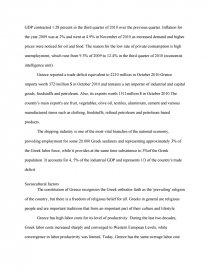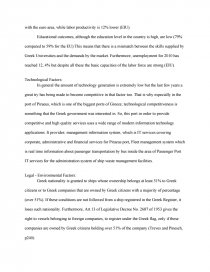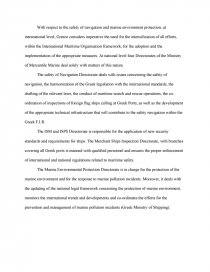Pestle Analysis for Greek Shipping
Essay by nikky • September 1, 2011 • Case Study • 1,107 Words (5 Pages) • 4,113 Views
PESTLE ANASYSIS
Political Factors
Greece is an EU member state with a population of 11 million and has enjoyed a stable political environment since 1970s (parliament republic), joined EMU in 2001. At this point of the financial crisis, the Government of Greece is in the need of the IMF needed a financial support package in order to restructure its debts. Because of all these the Government tries to make Greece competitive again and press on with the structural reforms and privatisations in the large state sector, being supportive of foreign investments.
Greece is one of the few countries in the world that has a dedicated specialised Ministry dealing exclusively with all issues related to merchant marine. Government controlled privatizations in port activities and terminals, present large scale opportunities for foreign direct investment in Greece's shipping sector. Already COSCO, a Chinese investor, has taken over the interests and management from the Greek government at a part of the container terminal in the port of Piraeus, which demonstrates the interest of foreign direct investment into Greece's shipping industry. Another fact is that the Greek constitution included a guaranteed right of capital mobility for shipping companies, which has reduced the level of uncertainty associated with shipping investments and encouraged Greek ship owners to return home as well as repatriate capital over the last three decades. The current tax system includes the following provisions: an easier to enforce tonnage tax in lieu of tax on profits for ships on Greek register; no capital gain tan on ship re-sales and no tax levies on accumulated capital in any form; foreign shipping businesses are exempt from income tax as well as other control s applying to limited liabilities companies (Hellenic Shipbrokers Association).
Economical Factors
International economic developments influenced significantly the Greek economy. The GDP contracted 1.28 percent in the third quarter of 2010 over the previous quarter. Inflation for the year 2009 was at 2% and went at 4.9% in November of 2010 as increased demand and higher prices were noticed for oil and food. The reason for the low rate of private consumption is high unemployment, which rose from 9.3% of 2009 to 12.4% in the third quarter of 2010 (economist intelligence unit).
Greece reported a trade deficit equivalent to 2210 million in October 2010.Greece imports worth 3721million $ in October 2010 and remains a net importer of industrial and capital goods, foodstuffs and petroleum. Also, its exports worth 1511million $ in October 2010.The country's main export's are fruit, vegetables, olive oil, textiles, aluminium, cement and various manufactured items such as clothing, foodstuffs, refined petroleum and petroleum based products.
The shipping industry is one of the most vital branches of the national economy, providing employment for some 20.000 Greek seafarers and representing approximately 3% of the Greek labor force, while it provides at the same time subsistence to 5%of the Greek population. It accounts for 4, 5% of the industrial GDP and represents 1/3 of the country's trade deficit.
Sociocultural factors
The constitution of Greece recognizes the Greek orthodox faith as the 'prevailing' religion of the country, but there is a freedom of religious belief for all. Greeks in general are religious people and are important traditions that form an important part of their culture and lifestyle.
Greece has high labor costs for its level of productivity. During the last two decades, Greek labor costs increased sharply
...
...



